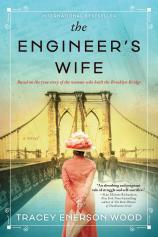Excerpt
Excerpt
The Engineer's Wife

1867
Champagne corks exploded skyward as a band played Sousa marches for a cheering crowd at the riverside. After years of torturous work, the Cincinnati-Covington Bridge was complete. Thousands attended the April dedication, climbing on chairs to toast the Roeblings.
Papa, Wash, and I were escorted to our seats in the front row—white wooden chairs stenciled with our names. A city official presented me with a bouquet of roses. It was certainly a lovely tradition, but my cheeks pinked, accepting honors for someone else’s achievement. Papa popped up like a jack-in-the-box, shaking admirers’ hands.
I perused the program, complete with likenesses of both Papa and Wash.
“Quite the show.” Wash let his long legs sprawl in front of him, his face more relaxed than I had seen in two years.
“You have much to be proud of.”"
“I’m just glad it’s done and Papa and I are still on speaking terms. We learned an awful lot.” Wash folded his program into careful creases and tucked it into his jacket pocket.
“Yes, now the next bridge will go up lickety-split,” I said.
Papa looked at me, his eyes twinkling with amusement. “Haven’t you told her?”
Wash shrugged.
My heart sank. This did not sound promising.
Papa jutted his jaw at the new bridge in front of us. “The East River Bridge will be much more difficult than this one. A longer center span and higher for tall ships. It’s not a serene river like the Ohio but deep and turbulent and tidal, changing direction twice each day, sometimes flowing at great speed.”
He pulled note cards from his pocket and passed them to Wash. “Germany, France, and England are innovating underwater foundations. Go there. Study the latest technology.”
Wash tried to hand the cards back. “Papa, I’ve told you, we—”
“You can take Emily.” He caught my eye and winked. “Consider it a belated honeymoon, on me.”
“And what of the fundraising for the East River Bridge?” I dreaded holding up my end of the bargain. Although throwing dinner parties would be amusing, I would rather swim upstream with rats than give a speech. A trip to Europe was much more to my liking.
“Enough time for that when you get back. I’m going to round up a bunch of bigwigs and take them on a tour of all my projects. Until the concept has a firm foundation of support, there won’t be much you can do.”
Despite the thousand or so onlookers, I leapt from my chair. Father and son rose in courtesy and confusion, and I nearly toppled them with hugs. “Thank you, Papa.”
Wash gripped my upper arm, whispered in my ear, “We should talk about this.”
***
After the ceremony, Wash and I packed our belongings, eager to escape our bleak little flat. “So you’re excited about Europe?” His voice lacked inflection.
“Of course! Aren’t you?” I tried to stuff the fancy dress I had worn to the bridge dedication into a trunk, but it popped back out. A real home with a maid and cook could not come soon enough.
“Do you understand what this means?” Wash sorted work clothes. Useable ones went into a crate, and those too frayed or soiled went into a heap on the floor. He moved sluggishly, taking too long for each simple decision.
I took a rotted set of trousers from his hands, tossed them aside, and wrapped his arms around me. “We’ll have a whole year away from your father and the infernal schedule he keeps you on. You’ll learn all sorts of new things, and we’ll see places others only dream about.”
Wash pushed away, holding me at arm’s length. “I’ll be signing up for another bridge project. This one is more dangerous and will take much longer to complete.”
“Yes. That’s what you do.” I tried to read his eyes, but he avoided my gaze. “Have I complained too much?”
“Of course not.”
“Then what is it, dear? I want to support you in any possible way.”
“I know you do.” His eyes finally met mine. “But what if I don’t want to do it anymore? What if I want to live on the coast of Maine and paint the seagulls or buy land in Kentucky and raise racehorses?”
“Those are my dreams. You don’t even like horses. Building the bridge has been your dream since forever.”
“It’s what Roeblings do.”
“I knew that when I married you.” I ran my fingers through his hair, still not sure what was bothering him. But the way he relaxed into my arms, it seemed he wanted what I did, to follow his dreams with me by his side. I contemplated sharing some exciting news, but the time was not quite right.
To Europe
In port, the ship offered a new perspective of the New York skyline. The buildings in midtown crept ever higher, reminding me of children standing chin to nose, proclaiming now I’m the tallest. Trails of horse- and man-drawn carts, laden with merchandise, flowed back and forth from barges to warehouses squatting on the riverfront.
Hordes of people turned out to bid farewell to the steamship on the warm June day. I had been one of them many times, waving to the lucky passengers lining the decks. Now, we were the lucky ones, leaning against the rails of the RMS Scotia, blowing kisses, as the ship blew its farewell horn. Mother alternately waved a handkerchief and dabbed her eyes with it. GK, a head taller than the rest, waved an American flag.
The sight of GK especially tugged at my heart. During our time in Cincinnati, he had faced a terrible challenge. In order to cover their own poor judgment, Generals Grant and Sheridan had accused him of making cowardly decisions during the war. During the Battle of Five Forks, Grant had ordered GK to move his troops to support Sheridan. Grant had promised Sheridan the reinforcements would arrive sooner than was humanly possible. In addition, GK had to disentangle his units from other skirmishes and cross a river after the bridges had been destroyed. But all Sheridan saw was that GK did not show up in time, and he accused him of dithering.
My dear General, I had begun a letter.
In his reply, he wrote, I find I must once again provide guidance for you, dearest Em. The proper salutation is “My dear Major.”
Pangs of guilt tore at me for leaving on a grand adventure, helpless to ease his pain.
After a final wave goodbye, a porter led Wash and me on a tour through the ship, heading toward our stateroom. “She is the second largest and the fastest oceangoing ship in the world,” he boasted above the chug of the engines and rush of water through the paddle wheel.
As we left the harbor, Wash and the porter argued about paddle wheels versus screws while I let the balmy salt air caress my cheeks.
In our stateroom, scale diagrams, models, and maps of New York Harbor crowded the cabin and walls. I waded through steamer trunks and piles of textbooks, shoving them aside to make order from the mayhem.
“Oh look, champagne.” Wash nudged out the cork with a delightful pop, filled two glasses, and handed one to me. He lifted his for a toast. “To Europe.” We clinked glasses, and he kissed me. “Darling, I’ve been terribly preoccupied, but I promise you’ll have my undivided attention the entire voyage.”
I eyed the room full of evidence against him. “No apology necessary. You’ll study bridge building, and I’ll see Europe—a fair trade, is it not?” I sipped, the cool bubbles tickling my nose. But despite his promise made mere seconds ago, his eyes fell upon the wooden models dominating the tiny table.
No, not again. A choice needed to be made: I needed to learn of his world or return to the familiar feeling of abandonment. It wasn’t in me to settle for a life of domesticity—managing a household and having chats with my husband about the wallpaper or the rats in the cellar. In Cincinnati, we had drifted apart. I wanted to know his worries, help him think through difficult problems, be his partner in life. His work was so central to his being—I had to understand it.
I picked up a model labeled Pneumatic Caisson. It resembled a wooden shoebox without a lid, its exposed edges sharpened and several smaller boxes fastened within. “I will accept your undivided attention. Can you explain this contraption?”
He came up behind me, surprising me with an embrace. “Caissons can wait,” he murmured in my ear. He pulled the ribbons that held up my hair and let it tumble. We kissed, and he led me toward the cabin bed with its crisp white sheets.
I stopped him with a palm to his chest, even though this was what I longed for on many lonely nights. “Just a short lesson. I’d like some understanding of what takes you away from me every waking hour.”
He sighed. “As you wish, dear, a short lesson, under protest.” He led me back to the table, and I picked up the model. “To begin, we build wooden caissons in the shape and size of the footprint of each bridge tower.” Behind me, he pressed against my back, wrapping his arms around me.
“A huge, empty box?”
He nodded, clasped his hands over mine to turn over the model, open side down. “An open-bottom box about 100 by 170 feet—about a third the size of a city block.”
“Hard to even imagine.”
“Quite so. We caulk the seams with oakum and wrap it in iron to make it waterproof and airtight, then float it into place in the river, upside down, just like this. These caissons will be the foundations for the towers.”
“Float? Seems it would be awfully heavy, wrapped in iron.”
“About three thousand tons, but that won’t matter. Compressed oxygen will be pumped in to keep it afloat as it moves into position. After that, we continue pumping in oxygen to keep the men working in the caisson alive.” He kissed the back of my neck as one hand stealthily left the model and unfastened the buttons on the back of my dress.
“As we build a tower of stone on top, we dig out the unstable silt beneath and send it up a chute.” He traced a path up my back, then ran it down my spine. His lips grazed my ear, making me shudder. “The bottom edges, or shoe, cut the path, and the caisson sinks far below the riverbed to bedrock.” He pushed the model and my hands down.
I scooted the model back onto the table.
“Compressed air…keeps…while workers dig… No, I can’t do this.”
He took a step back. “I have single-mission brain and body parts. I can speak of bridges or make love, not both.”
I twisted around and poked his belly. “Ah, it would appear we have finally found your limitations.”
“Indeed. Which shall it be? A lesson…or love?” He wrapped his arms around me, a decision made.
From the moment he dropped to one knee in a garden, Wash had been telling me to always choose love. When I pointed out that he often chose work, he would say, “My work is how I show my love. Would you rather I spent my time in pursuits that failed to support you?” But did he understand the heartbreak and fragility of love?
Perhaps his emotional constitution was sturdier than I had presumed. It had to be, to go through war, to work under great pressure, with his own father, to love a woman who defied and rebelled, even when she wasn’t sure what she was rebelling against.
The Engineer's Wife
- Genres: Fiction, Historical Fiction, Women's Fiction
- paperback: 384 pages
- Publisher: Sourcebooks Landmark
- ISBN-10: 1728226252
- ISBN-13: 9781728226255



